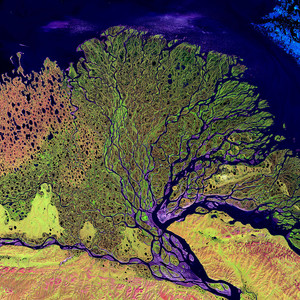Two major questions and reflections emerged during this session. One of them is concerned with whether a sort of “naturalness” applies to the delta or in other words the question of what makes an area be called a delta? The other one is a critical reflection on multiple delta ontologies and the separation of land and water following it.
The “naturalness” of the river basin – what about the delta?
Molle’s article is not directly dealing with the concept of river delta, rather he invites us to critically investigate the history and trajectory of the concept of river basin. To unpack the social and political life of this concept is even more important, he argues, because of its centrality in water management today, which however remains largely unquestioned. By tracing its history, Molle shows, that the idea of the river basin first emerged in the drive of planners and engineers to master nature. The hidden cost of these developments and new uses, for instance aesthetic and recreational ones, only appeared later. Gradually the river basin became a wider political arena, where contrasting interests and worldviews confront.
An interesting point is that Molle shows how the river basin concept is linked to a very strong idea of domination of nature, and that its strength comes from its “naturalness”. Following these arguments, we reflected about whether a sort of “naturalness” also applies to the delta.
The text of Francis Celoria highlights some interesting aspects of the origin of the delta term. First, a difference has to be made between the delta as a place name and the delta as a technical term. The denomination ‘delta’ goes back to the Ancient Greek who associated the shape of the sediment island at the mouth of the Nile to the likewise triangular shape of their letter “d” (delta). However, Celoria argues that Herodotus in the 5th century BC didn’t introduce the technical term, but only used the word delta as a proper place-name for the mouth of the Nile. It was only much later, after Alexander the Great’s invasion in India, that the word took on its general technical significance. Thus, it was by travelling and through comparison with other similar shaped landforms, that the term delta gradually gained its generic meaning. In other words, some “naturalness” surely exist according to this analysis for natural features of different landforms generated the technical term “delta”.
In his thesis Zegwaard looks at what makes deltas into deltas. He is interested in the ways deltas are made and continuously remade through the practices of delta planning. Thus, he chooses a very specific approach where he assumes that deltas come into being through the practice by which they are known and planned. Zegwaard rejects the idea of deltas being ontologically similar objects for which a generic knowledge can be developed, even if he doesn’t deny that a form of deltaic materiality pre-exists delta planning activities. In Zegwaards approach the delta is seen as an “object” constructed through practices of engineers and experts for it is through delta planning that geographically different locations become similar problem arenas. In this process of “creation” of the delta, the production of futures function as powerful tools in defining the specifics of the delta. This approach and assumptions make sense in Zegwaards analysis, where he is interested precisely in the process of planning a delta and adopts the perspective of engineers and of delta planners. However, it remains a very specific way of approaching deltas and might not fit other studies. Therefore, we should reflect on what happens when we take on a different “pair of glasses” than the one of engineers and planners, what about delta inhabitants? How do they perceive the delta and what terms do they use for it? What is their role in the coming into being of the delta?
If we can certainly find some “naturalness” and characteristic of deltas, such as the amphibiousness of life, the back and forth and negotiation between sea and land, alluvial land in emergence and flux, constantly in motion, etc. it remains difficult to grasp what a delta is, where it starts and where it ends and whether these characteristics are exclusive for deltas. Aren’t some of these features also found in wetland life, floodplain life and coastal life? So, is a delta maybe composed of overlapping spheres of social life?
These and many other questions remain to be answered, however, we consider that the delta term is a powerful term, the delta concept has a specific history and we should always critically reflect about that and not take the “delta” denomination for granted.
Plurality of delta ontologies
Based on the example of aquatic and terrestrial infrastructures in deltas of Southeast Asia, Jensen and Morita argue that divergent infrastructures not only reflect different histories and political origins but that they also enact contrasting cosmological dimensions. It is, according to the authors, its amphibious character, that makes it possible to enact the delta in radically divergent ways. As this, the delta can be conceived either as an extension of the see (traditional “galactic polities” of SE Asia) or alternatively as an extension of the land (western vision), both leading to different types of infrastructures. Therefore, the authors claim that instead of understanding these infrastructures merely as different technical systems, we should rather think of them as different delta ontologies, a notion that aims to understand the dynamic interplay between infrastructure and cosmology.
Likewise, Zegwaard suggests that deltas should be seen in a multiple ontology perspective. As already mentioned, he argues that deltas can’t be considered as ontologically similar objects and explores how different ontologies shape plans that are being made for the deltas adaptation to anticipated future problems.
Both of these texts advocate for taking in account multiple delta ontologies, that is, deltas emerge through particular ontologies that co-exist today. Certainly, there are different infrastructures in the deltas, linked to diverging politics and cosmologies, structuring the delta in different ways, thus remaking the world, however, can we speak of clearly distinct and separating ontologies?
This perspective might work if we consider practices and the enactment of the delta of engineers, experts and travellers coming from outside the delta. But if we take on another perspective and examine what happens in the delta, there might not be two exclusive realities that co-exist as rigid categories such as aquatic and terrestrial. In these analysis however there is no critic distance of the concept of ontology, so that different ontologies appear as separate and exclusive categories where no hybrids, no translation and mediation between them is possible. Furthermore, these ontologies are at a very general level, being for instance either aquatic or terrestrial, but can we pretend such a unity within ontologies without any variance? Isn’t this a misleading simplification and caricature?
References
Celoria, F. (1966). Delta as a geographical concept in Greek literature. Isis, 57(3), 385-388.
Molle, F. (2009). River-basin planning and management: The social life of a concept. Geoforum, 40(3), 484-494.
Morita, A & Bruun Jensen, C. Delta ontologies: Infrastructural transformations in Southeast Asia. Social Analysis.
Zegwaard, A. (2016). Mud: deltas dealing with uncertainties.

